A young girl with disabilities survived repeated abuse. When she finally broke free, she became the advocate she’d been searching for all along.
Content Note: This story contains a survivor’s non-explicit descriptions of sexual violence against children with disabilities.
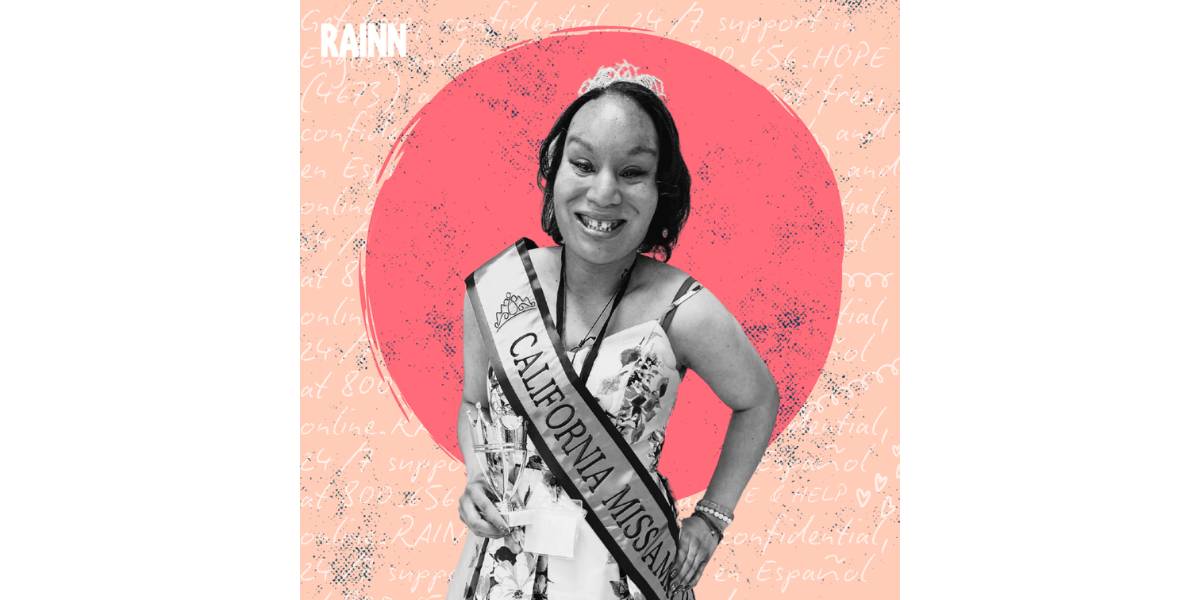
“I went through a whole lot of trauma in my childhood and teenage years—things I didn't understand that were extremely painful.”
Saida (she/her) was born on the cusp of the 21st century, a Gen Z baby with dark hair and bright, curious eyes. She was unique from most newborns, however, in one particular way: “I was born with a rare genetic condition called partial trisomy 8Q duplication syndrome that caused me to have delays when I was a little girl,” she explained. “I had neurological struggles, neuromuscular conditions, and speech and language difficulties.”
The chromosomal anomaly qualified Saida for special schooling with educators trained to help children navigate chronic medical conditions and disabilities.
In the supposed safety of her classroom, Saida first suffered sexual abuse at the hands of someone she should have been able to trust.
“My teacher was good, but the teacher’s assistant—she just did not like me at all,” Saida said.
She was in kindergarten, the age when kids track time by snack breaks and recess. On this particular day, the teacher’s assistant held Saida back when the rest of the class left for lunch and playtime.
“I don't like people like you,” the assistant spat at Saida. “I don’t like disabled people.”
Eager to escape the woman’s vitriol, Saida got up from her desk and went into the classroom’s small student bathroom. “I thought maybe she would leave the classroom so I could go and get my food and have recess with everybody,” she recalled. “Minutes later, I heard her opening the door to the bathroom.”
Saida didn’t understand what happened next. She only knew it was painful—and very, very wrong.
“I didn’t understand abuse at all.”
Getting Help
Day after day, the teacher’s assistant found excuses to separate Saida from the rest of her class so she could abuse the young student.
Saida’s suffering grew so intense, she finally spoke up. “I told my mom I was having problems there, but I didn't know how to communicate with her what was really going on because I didn't understand what I was dealing with. I didn't understand abuse at all,” Saida shared. “I just told her I needed to get out of there.”
Saida’s mother was unaware of the abuse her daughter was suffering, but she did exactly what a clinician would recommend: she listened, she believed, and she took action, immediately moving Saida into a different program.
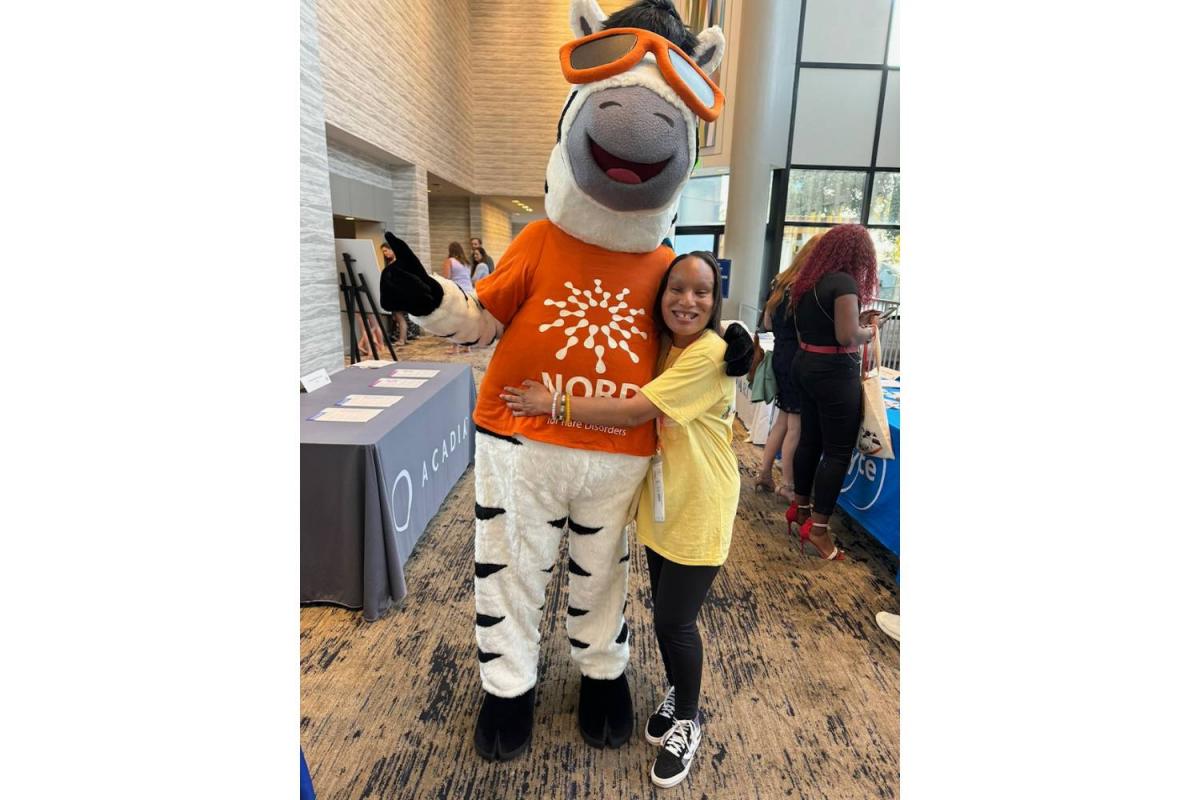
Saida hugs the orange-shirted zebra mascot for NORD: National Organization for Rare Disorders. Photo courtesy of Saida M.Caption
This belief and this move to take action and listen to the child when they say that something is wrong—that’s so important. So often, children don’t have the language to explain that something abusive is happening to them, or parents dismiss concerns as signs of behavioral issues on the part of the child, which can lead to children being even more likely to keep quiet. They don’t want to get in trouble—but they might desperately need help. Children need their parents on their side to advocate with them.
– LAURA SIMS (they/them), LPCC, RAINN senior manager of consulting
Every 9 Minutes
In the U.S., a child is sexually abused every nine minutes, and 82% of those victims are girls.
Before age 10, Saida would be victimized by sexual predators again and again—at summer school; by a school bus driver and his female partner; by a camp counselor.
Saida was 12 the first time someone raped her and only 16 when a boyfriend began grooming and eventually trafficking her for sexual assault.
“I carried the weight of all that trauma throughout my growing-up years,” she revealed. “It was getting so hard for me to enjoy my activities, my friends, and social groups. I was self-harming and wanted to commit suicide.”
Saida was in her mid-twenties when she began demanding comprehensive answers about the extensive abuse she’d endured and the baffling health challenges that plagued her.
First, she found a new medical team—one that took her concerns seriously. Thanks to these dedicated medical professionals, she finally learned, “I also have congenital muscular dystrophy and cerebral palsy.”
With doctors finally treating the full range of Saida’s health conditions, she felt ready to take stock of the abuse she’d kept secret for so long.
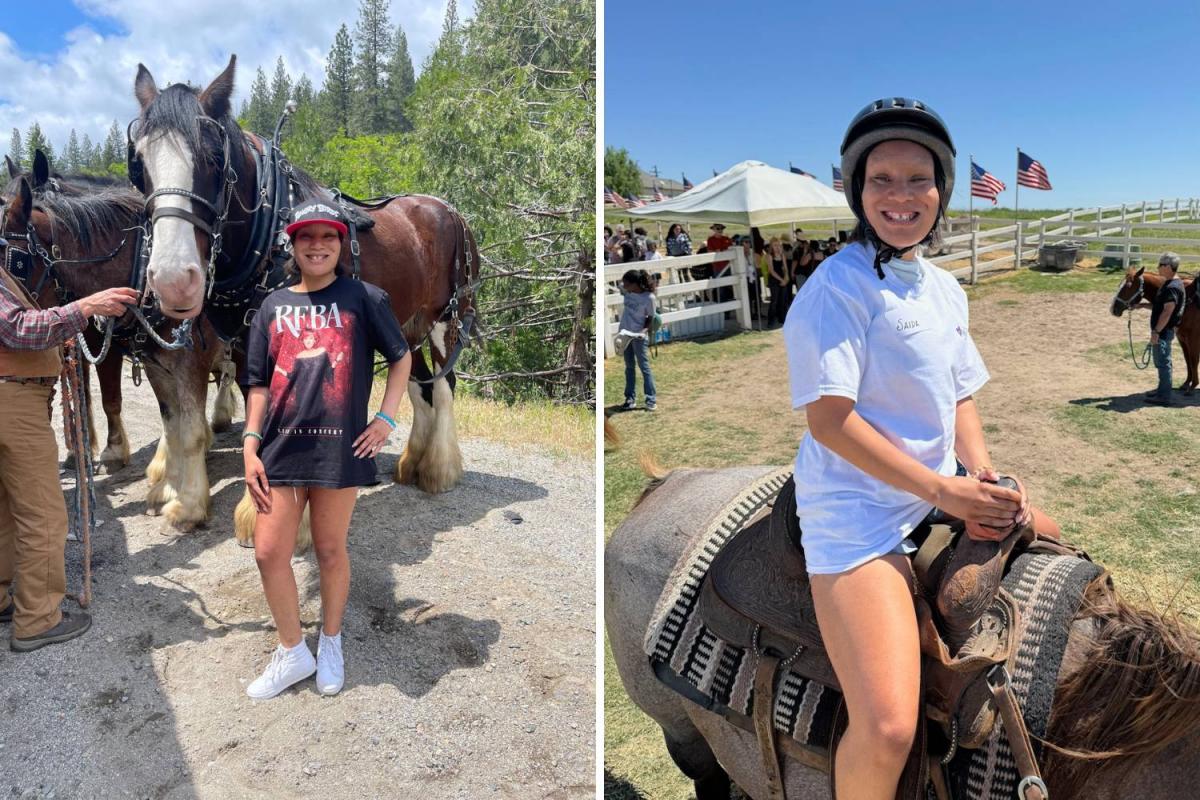
Saida, shown horseback riding, relies on her many passions and hobbies to keep her physically, mentally, and emotionally strong. In the LEFT image, Saida is wearing a Reba McEntire t-shirt in honor of one of her favorite musical artists. Photos courtesy of Saida M.
Breaking Free
“I couldn't hold it in anymore,” she said, “and in 2022, I started breaking free. Slowly. I took my time and eventually just let it all out.”
One of Saida’s close friends was the first person to identify Saida’s experiences for what they truly were: sexual violence.
“When I broke free from being a silent sufferer, I was looking for organizations that specialized in disabled survivors,” Saida explained. “But there was nothing there.”
Even worse, Saida felt actively excluded by many of the organizations she looked into. After a lifetime of battling stereotypes, Saida felt confident she knew why:
“They think disabled people don't know how to function. It's a huge stereotype,” she asserted. “But people with disabilities are all affected differently. Some don't have the same skills as others, but they’re still human; they still deserve help; they still deserve access to support.”
Therapy plays a crucial role in recovery for many survivors, but once again, Saida encountered stigma and discrimination.
“It took me years to get therapy because nobody wanted to deal with a disabled survivor,” she said. “Then a lot of therapists tried to make me feel like I didn't know what I was talking about—like everything was my fault. But that's not therapy. That’s bullying.”
Effective therapy should always be about recognizing the survivor’s lived experiences, their agency, and their own understanding of what happened to them. Sexual abuse is never a survivor’s fault and this kind of interaction can amplify the shame that many survivors already feel about what happened to them.
– LAURA SIMS (they/them), LPCC, RAINN senior manager of consulting
Angry and frustrated, Saida decided to abandon therapy. “It was not helping me with my healing journey, and I thought, I’ll just help myself. And so mom helped me, my friends helped me, music helped me—they all helped me have the strength to move forward.”
A World Where Survivors Feel Heard & Included
As always, Saida’s mom was one of her most devoted supporters. “She kept encouraging me to find resources, and eventually I found RAINN,” Saida said. “I got help from RAINN.”
The support she found through the RAINN National Sexual Assault Hotline gave her immense relief. “When I told RAINN what all had happened to me, they helped me understand everything I had been dealing with,” she shared. “They explained that what I went through was a form of trafficking—I did not know that! Trauma just is not talked about in disability communities. A lot of disabled people don't even know about RAINN.”
“So many disabled people are afraid to talk about what they went through because they don't think they'll get support,” she explained. “They’re afraid to reach out because they don't see themselves represented in the survivor community.”
Saida’s inclusive vision is for a world where every survivor feels heard and included:
“We need people who are living with disabilities to talk about these issues.”
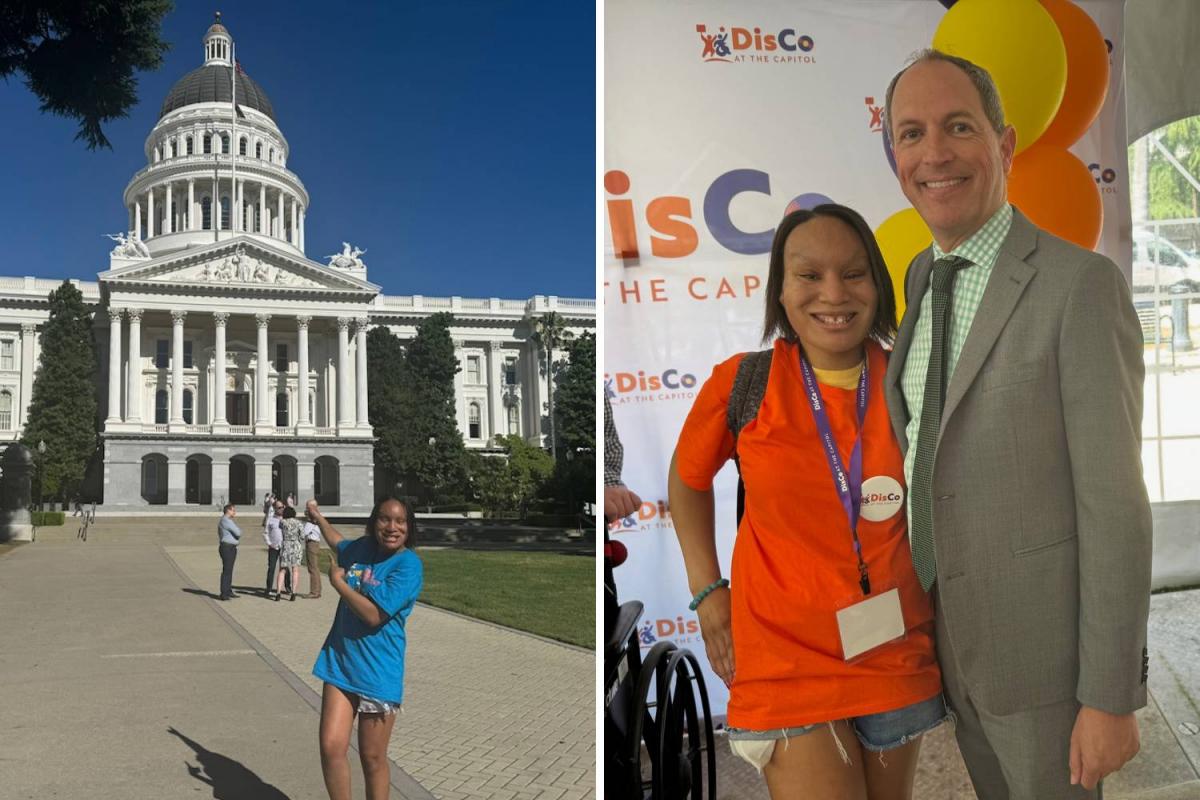
LEFT: Saida in front of the California State Capitol building in a bright blue t-shirt. RIGHT: Saida stands with California Assembly Member Brian Maienschein (D – 76) at DisCo at the Capitol. Photos courtesy of Saida M.
“We need organizations that can help survivors who are disabled and deal with medical conditions. We need support services for people who have communication barriers. We need virtual events where disabled survivors lead the conversation. We need conferences where people can learn how to truly help survivors with disabilities. And we need people who are living with disabilities to talk about these issues.”
Wondergirl Saida
From the ashes of a painful past emerged the “brave, outgoing, courageous, strong, and determined” young woman she’d always been—only now, she knew it.
“I started my ‘Wondergirl Saida’ podcast channel where I could talk about real things—a real, authentic platform where I can use my voice the way I want,” Saida described. “I didn't want to be hindered. I didn't want to be interrupted. I just wanted to be my full expressive self.”
Over five years, Saida released 12 seasons of the Wondergirl Saida podcast, earning devoted listeners from all over the world. “It’s been very, very healing for me,” she said. “A lot of people say my podcast has brought them hope, warmth, and strength—that they are inspired by it and love that it's positive.”
From podcasting and blogging to writing and creating social media content, Wondergirl Saida forged a path others told her was impossible. “I want to educate people and raise awareness and help people,” she said proudly. “I’m not ashamed to do it and I'm not afraid to do it. I just tell it like it is!”
Saida also leveraged an unexpected platform to amplify her message: Miss Amazing beauty pageants. As part of Miss Amazing, a national self-esteem movement for girls and women with disabilities, Saida found she also related to many of her fellow “sister queens” as survivors of abuse.
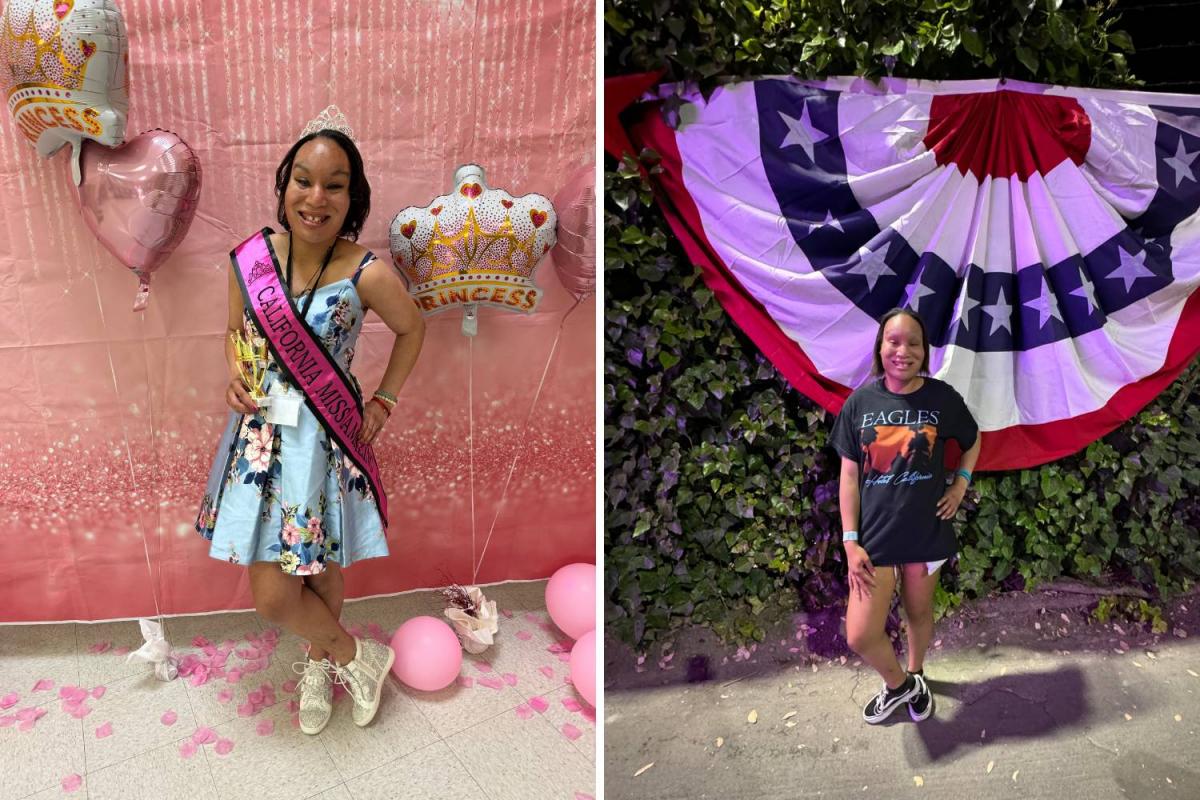
LEFT: Saida strikes a pose in her California Miss Amazing sash and tiara. RIGHT: Saida stands in front of a red, white, and blue festoon while wearing a t-shirt for beloved band The Eagles. Photos courtesy of Saida M.
“When I shared my survivor experiences at the Miss Amazing National Beauty Pageant, they all felt like somebody heard them for the first time,” she said. “They felt like they had somebody supporting them.”
Today, Saida encourages other survivors:
“Don’t be afraid to speak up. Don’t be afraid to talk about what you’ve been through. There's hope. You are not alone, and you should not feel excluded. You deserve to feel included and accepted and loved and cared for in your own unique way.”
And to supporters and advocates, Saida says, “Don't be afraid to help a disabled survivor. Give them lots of help and care and support. Don't exclude them. Disabled survivors are going through a very tough time, and they need help—they deserve help. Because they're human just like everybody else.”
Saida invites people to follow her journey: listen to her podcast, read her blog, and follow @WONDERGIRLSAIDA on social media.
Help protect children from abuse. Learn to recognize the signs of grooming.
And if you need someone to talk to, contact RAINN. Our support specialists provide free, confidential, 24/7 support in English and Spanish.
Call 800.656.HOPE (4673) or Chat Live at hotline.RAINN.org.